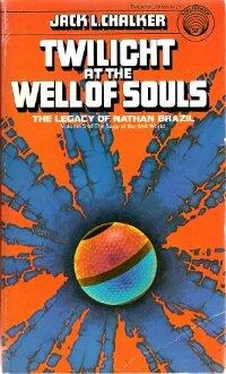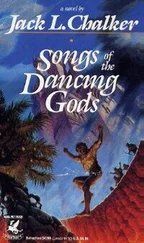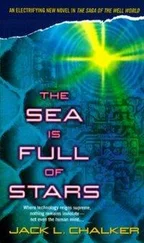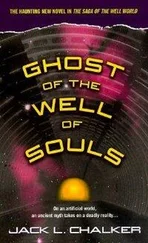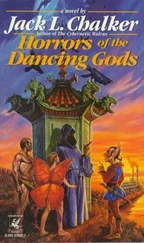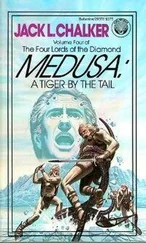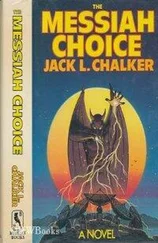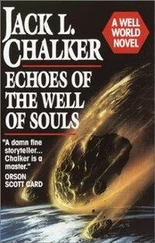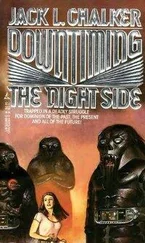“Do you think he’ll kill himself?” Ortega asked. “I think I understand him now, a little. I’ve lived too long and I’m ready to go, but I couldn’t bring myself to do it. Now I can, and it’s a blessing and a relief. You can’t believe the lack of a burden I feel. You can live too long, Doctor. Particularly when you can’t change.”
Zinder considered the question. “Will he kill himself? He’s said so, many times. He’s said that that’s the only thing he wants to do. I think that’s what Mavra Chang is there for—to receive the passing of the torch. She will go inside and be taught the workings of the Well, and it’ll be matched to her. Once that happens and he checks her out on it, well, then he can die with a clear conscience. Somebody will be left to guard the truth, and instead of the Wandering Jew the new humans will have the mysterious, immortal woman.”
“What a horrible fate,” Ortega sighed.
“But it’s of her own free will,” Zinder pointed out. “When she tells him to turn off the machine, she takes full responsibility for the consequences, all of them. When she emerges, she’ll be the only being anywhere left based on the present, rather than the new mathematics. She won’t be able to be killed, or changed, and she’ll be like that until she can turn it over to some wiser future race, if it ever arises, that again discovers the Well equations and does something with them other than destroy itself. If they do destroy themselves, some billions of years, perhaps, from now, she’ll have the job of starting it all over again and maybe passing the torch herself at that point.”
They thought about it, thought about the loneliness, the aimless wandering, without change, without end, the Well not even permitting madness. For a while she would enjoy it, of course, as Brazil must have, as Ortega had in his more limited yet no less oppressive self-exile. But, eventually, she would reach that point when she had lived too long, and she would know. “ I don’t think she realizes the devil’s bargain she’s making,” he said sadly.
Zinder shrugged. “Does anyone? And can we go back and do it all again? Can I undo the damage to the universe? To the Well? No, I think not. Not any more than you can take back any of your crucial decisions.” He paused. “I better go now. Yua must be told —and I want to be back by dawn.”
Serge Ortega put out his hand and Zinder took it. “Until dawn, then, Gilgram Zinder. We shall meet, together, down there at the canal, eh?”
“At the canal,” the other man agreed. “But not Doctor Gilgram Zinder, no, not now. Most of him died in Oolakash about nine hundred years ago. What little of him survived that event died with Nikki on Olympus and the rest with Obie on Nautilus. I’m just Gypsy, Ortega. That’s the way I want it to be, and so that’s who I am. I can be whoever and whatever I want.”
“Wait! One more thing!” the Ulik almost shouted. “How will we know if we held long enough? Can you tell me that?”
Gypsy laughed. “If I’m here, you’ll know for sure and in a very sudden and messy manner. If not—well, if you can last until night, and if it’s clear and you’re in position to see a little bit of the sky, you’ll see the stars go out.”
“But that’s impossible!” Ortega protested. “Even if the universe goes out, it would be thousands of years before we’d know!”
“When he pulls that plug,” Gypsy told them both, “the universe won’t simply cease to be. For all practical purposes it will never have been. There never will have been those stars and dust to radiate that light. There’ll be nothing but the dead Markovian universe —and the Well World. Nothing else will exist, will ever have existed, beside that.”
It was a sobering thought.
“One last thing,” Marquoz put in. “Did you tell Brazil who you were?”
Gypsy chuckled. “Nope. He fished for it, but he wouldn’t tell me why a Markovian guardian should be a Jewish rabbi, so fair’s fair.” And he vanished.
“That’s a good point,” Ortega noted to nobody in particular. Finally he turned to Marquoz. “Since you’re going to be here, you’ll take command of the Verion side, I trust?”
Marquoz nodded. “It’s all arranged. They’re ready to fly me over whenever I’m ready.”
For the second time that night Ortega extended his hand in firm comradeship and for the second time it was taken in the same spirit.
“Like with Gypsy,” Ortega said. “We’ll meet at the canal.”
“At the canal,” Marquoz agreed. “We’ll be only thirty meters apart.”
“We’ll swim it,” Ortega said warmly.
There was a loud explosion downstream, not at all near them, and lights went on farther down. There was some automatic-controlled fire, then everything winked off and there was silence.
“I’d better go,” the Hakazit said, the echo of the explosion and shots still sounding up and down the canyon. He turned, then paused and looked back. “You know, wouldn’t it be crazy if we won?”
Ortega laughed. “It’d louse up all this for sure.”
Marquoz turned back and trudged off in the darkness. Ortega remained, sitting back on his tail and looking out into the darkness, settling down to wait for the dawn and trying, on occasion, to get a look at the obscured stars above.
The Avenue, at the Equatorial Barrier
Serge Ortega had been as good as his word. although they had passed signs of fighting and occasional dead bodies of hapless patrols, no opposition faced them all the way up the Avenue. A few times they had almost fallen into the water from the unstable rock slides, but that had been the extent of the problem.
Mavra had never seen the Equatorial Barrier except from space, and now that it loomed over her she found it much less a dark wall than it looked from a distance. Partially translucent, it went up as far as the eye could see, a huge dam at the head of the river, which was merely a trickle at this point. She noticed that the area where the Avenue reached the wall was absolutely dry; obviously the only water here would be that which struck and ran down from the enormous barrier.
It looked like a giant nonreflecting shield of glass, not very thick and amazingly shiny and free of any signs of wear. It was only here, at the wall itself, that the true Avenue could be seen—shiny and smooth, like the barrier itself. Where it joined the wall there was no seam, no crack; the two simply merged.
It was near dusk of the second day, but even Brazil could not enter immediately. Using the Gedemondan, now their only companion, he told the other two, “We have to wait for midnight, Well time, or a little more than seven hours after sunset. That means we sit and wait.”
Mavra relaxed and looked back up the canyon. “I wonder if they’re still alive back there?” she mused aloud.
“Yeah,” was all he could say in response. He didn’t really want to betray the fact to anyone, least of all Mavra, but he was deeply and sincerely affected by the sacrifice those creatures of many races, some of whom meant a good deal to him by this time, were making. The war was more of a mass thing, an abstract thing, and there were many possibilities in a battle. You could win or lose, you could live or die, but you always had a chance. They hadn’t had a chance and they knew it, yet they did it so that he could stand here.
His thoughts went back to Old Earth once again, to Masada in particular. He hadn’t been there, hadn’t really been very close to the place, but the history of the tremendous sacrifice they had put up, the miraculous amount of time they had held, and, in the end, their total commitment, which ordained death rather than surrender to tyrrany, had uplifted him at a time when he had felt desolate and dispirited. If man had such a spirit, there was hope.
Читать дальше
